 Research has revealed that two thirds of UK Internet users are deeply unchuffed about having to pay a BT line rental on top of their broadband subscription.
Research has revealed that two thirds of UK Internet users are deeply unchuffed about having to pay a BT line rental on top of their broadband subscription.
The stating-the-bleeding-obvious revelation was the conclusion of an online survey of more than 1,000 broadband subscribers in the UK who were questioned in June 2005 by online research company, TickBox.
The research, carried out on behalf of the broadband telephony outfit Vonage, also revealed that only 37% of Internet users believe there is a real choice of telephony provider, against 72% for mobile phones.
 Vonage has demanded ‘Naked DSL’ in the UK, which would enable consumers to independently subscribe to telephone and broadband services and allow users to subscribe to a VoIP service instead of a traditional fixed-line service,
Vonage has demanded ‘Naked DSL’ in the UK, which would enable consumers to independently subscribe to telephone and broadband services and allow users to subscribe to a VoIP service instead of a traditional fixed-line service,
In a statement, Vonage commented: “In the UK, by the end of this year, broadband subscribers will be paying a surcharge of £672m annually to BT in line rental on top of their broadband bill, no matter who their ISP is.”
“Broadband subscribers deserve the right to choose their broadband and telephone providers independently without being forced to pay for a telephone line they may never use,” clarion-called Vonage UK MD Kerry Ritz.
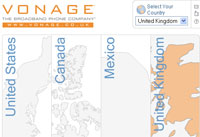 “The broadband infrastructure will support a variety of services, one of which is telephony. Customers should be able to decide what services they want to ‘plug’ into their broadband network in the same way that they choose their electricity provider,” he added.
“The broadband infrastructure will support a variety of services, one of which is telephony. Customers should be able to decide what services they want to ‘plug’ into their broadband network in the same way that they choose their electricity provider,” he added.
BT was quick to scoff at Vonage’s appeal, putting on its best supercilious tone while patting the upstarts on the head, saying that the company had little grasp of the costs involved in supporting its nationwide broadband network.
 “We are aware that applications providers that don’t contribute to the cost of building and supporting that ever improving broadband network have little appreciation of the economics involved,” said a BT spokesman. “Our customers, however, do”.
“We are aware that applications providers that don’t contribute to the cost of building and supporting that ever improving broadband network have little appreciation of the economics involved,” said a BT spokesman. “Our customers, however, do”.
 TV advertisers and execs could be heard blubbing into their double tall skinny lattes all over Soho as a new survey revealed that around 90 percent of current users fast-forward through ads.
TV advertisers and execs could be heard blubbing into their double tall skinny lattes all over Soho as a new survey revealed that around 90 percent of current users fast-forward through ads.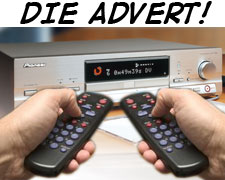 With more and more consumers buying digital video recorders (DVRs), this could spell disaster for the advertising industry.
With more and more consumers buying digital video recorders (DVRs), this could spell disaster for the advertising industry. Although the technology is still bubbling under the mainstream, BSkyB says about half of new subscribers opt for its Sky+ DVR, and with cable companies selling DVRs that are built into set-top boxes, advertisers are set for a bumpy ride ahead.
Although the technology is still bubbling under the mainstream, BSkyB says about half of new subscribers opt for its Sky+ DVR, and with cable companies selling DVRs that are built into set-top boxes, advertisers are set for a bumpy ride ahead. ‘The Man’ in the form of the EC wants to introduce regulation to the Internet by bringing in controversial rules to cover television online, according to a report in the Times.
‘The Man’ in the form of the EC wants to introduce regulation to the Internet by bringing in controversial rules to cover television online, according to a report in the Times.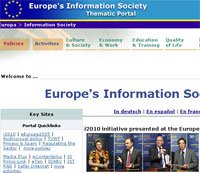 Internet-delivered TV is currently unregulated in the UK, so there is no compulsion for Web broadcasters to respect rules governing accuracy and impartiality or taste and decency that apply to all other analogue and digital channels.
Internet-delivered TV is currently unregulated in the UK, so there is no compulsion for Web broadcasters to respect rules governing accuracy and impartiality or taste and decency that apply to all other analogue and digital channels. Hefty prices and consumer-baffling technology continues to hold back the development and adoption of space age converged digital home solutions, according to a survey by Accenture.
Hefty prices and consumer-baffling technology continues to hold back the development and adoption of space age converged digital home solutions, according to a survey by Accenture. “In order to truly meet consumer needs, stronger collaboration and partnerships among hardware, content and service companies is imperative,” he added.
“In order to truly meet consumer needs, stronger collaboration and partnerships among hardware, content and service companies is imperative,” he added. But it’s not all doom and gloom, with consumers expressing a willingness to pay additional fees each month for services designed to enhance ease of use and convenience.
But it’s not all doom and gloom, with consumers expressing a willingness to pay additional fees each month for services designed to enhance ease of use and convenience.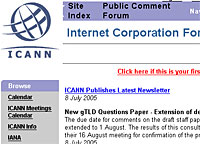 Consumers on the move will soon be able spot websites which have been specifically designed for mobile phones courtesy of the .mobi suffix.
Consumers on the move will soon be able spot websites which have been specifically designed for mobile phones courtesy of the .mobi suffix. The companies hope that the new mobile-optimised websites will encourage consumers to upgrade their phones and access the web more while on the move – and thus generate lots of lovely lolly for their coffers.
The companies hope that the new mobile-optimised websites will encourage consumers to upgrade their phones and access the web more while on the move – and thus generate lots of lovely lolly for their coffers.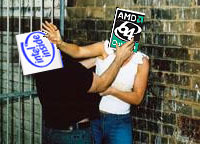 European Commission heavies made an unscheduled visit to Intel offices in Europe today as the chip maker’s offices were raided in connection with suspected anti-trust violations.
European Commission heavies made an unscheduled visit to Intel offices in Europe today as the chip maker’s offices were raided in connection with suspected anti-trust violations.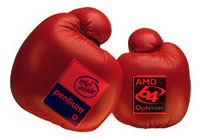 These requested information on government procurement tenders for computers containing requirements that they specify Intel chips or request a chip speed exclusive to Intel.
These requested information on government procurement tenders for computers containing requirements that they specify Intel chips or request a chip speed exclusive to Intel. The UK record industry trade association the BPI has revealed that download sales in 2005 have raced past the ten-million mark – almost twice the amount for the whole of 2004.
The UK record industry trade association the BPI has revealed that download sales in 2005 have raced past the ten-million mark – almost twice the amount for the whole of 2004. Illegal music downloads remain a thorn in the side of the industry, but the growth in legal downloads now outstrips the growth in dodgy file sharing with Jamieson adding, “The battle against illegal files-haring will continue, but we are delighted to have hit this milestone so soon”.
Illegal music downloads remain a thorn in the side of the industry, but the growth in legal downloads now outstrips the growth in dodgy file sharing with Jamieson adding, “The battle against illegal files-haring will continue, but we are delighted to have hit this milestone so soon”.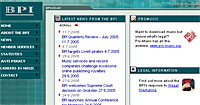 The resurgence of vinyl has been attributed to British indie and rock acts love affair with their near ancient format, with bands like Iron Maiden’s, Libertines, Babyshambles, Kaiser Chiefs and Franz Ferdinand all releasing songs on vinyl.
The resurgence of vinyl has been attributed to British indie and rock acts love affair with their near ancient format, with bands like Iron Maiden’s, Libertines, Babyshambles, Kaiser Chiefs and Franz Ferdinand all releasing songs on vinyl. New research from UK High Street bank Halifax reveals that over half of children between the ages of seven to sixteen years old have bought something over the Internet.
New research from UK High Street bank Halifax reveals that over half of children between the ages of seven to sixteen years old have bought something over the Internet. Not surprisingly, age plays a big part in who gets to shop online with less than a third of seven to eleven year olds (29%) clicking and buying compared to almost three quarters of twelve to sixteen year olds (73%).
Not surprisingly, age plays a big part in who gets to shop online with less than a third of seven to eleven year olds (29%) clicking and buying compared to almost three quarters of twelve to sixteen year olds (73%). The BBC has announced a pilot scheme to premiere some new TV programmes before they are broadcast on over traditional channels.
The BBC has announced a pilot scheme to premiere some new TV programmes before they are broadcast on over traditional channels. Jana Bennett, The BBC’s Director of Television, said: “The broadband premiere of The Mighty Boosh is a significant step forward in offering our audiences even greater value in a changing television world.
Jana Bennett, The BBC’s Director of Television, said: “The broadband premiere of The Mighty Boosh is a significant step forward in offering our audiences even greater value in a changing television world. There’s something of a stampede starting up of companies ready and willing to experiment with video over broadband, with BT announcing that it planned to begin trials of
There’s something of a stampede starting up of companies ready and willing to experiment with video over broadband, with BT announcing that it planned to begin trials of  The European Commission announced yesterday that it wants to give a boot up the backside of the European market for online music services by making it easier for new providers to get licences to flog songs over the Internet.
The European Commission announced yesterday that it wants to give a boot up the backside of the European market for online music services by making it easier for new providers to get licences to flog songs over the Internet.